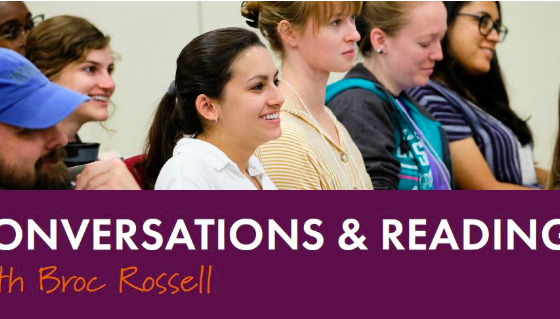The University of Denver is renowned for its English program, and for good reason. The graduate English course is number one in the nation, and English professors in every tier of study are accomplished teachers and artists in their own right. Wednesday, Jan. 9 proved a testament to the breadth of literary study here at DU, with both professors and alumni discussing various aspects of both poetry and literature.
The first speaker was Graham Foust, a Professor in the English program and world-renowned German to English translator with several publications under his belt. Foust examined “Small After-Church Poem”, a classic work of American poetry by George Scarbrough. The speaker gave an open discussion, more reminiscent of an intellectual conversation between peers than a lecture. Foust explored his changing perceptions and understandings of the poem through a diary, displaying how even those educated in literature still make new discoveries and improve upon their own analysis. “Small After-Church Poem” beckons to the beautiful simplicity of rural life, as a child ponders crossing a field of daisies beside a church. Faith and the innocence of childhood reverberate throughout the poem, as Foust helped the audience draw connections beside his own.
The second speaker was DU writing program alumni and guest of honor, Broc Rossel. The nationally-published poet shared elements of his writing process as well as a passion of his own—the origins of the American lyric. Rossel explained how poetry, and art in general, is not an original of singular creation, but rather a “collage” of past works, one’s own and others. In his discussion, the poet explained how his fascination with rural American lyric and poetry finds its roots outside the realm of academia. In his experience, poetry often draws from rural settings and indigenous cultures. Rossel also discussed the importance of reviewing the role of social activism in poetry. He stated, “Poets aren’t agents of social activism, but rather activated social agents.” Rossel elaborated, stating that although literature has the profound ability to create social change, we must also ensure that artists don’t overstep their bounds based upon a limited understanding of a situation, a statement truer now than ever.
Julie Carr, a professor at the University of Colorado Boulder, rounded out the evening by discussing the roots of documentary poetry and the false idealism of literature. The speaker utilized brutal excerpts from 19th and 20th century documentary poetry to examine how history is indeed written by the victors, or at least those in power. She further examined how portrayals of horrific incidents by those not in harm’s way often idealizes tragedy. This revokes much of our understanding of both literature and history, as the professor shone a new light on America’s complex history.
The panel proved both enriching in education and history, as each speaker contributed a unique view of poetry to the discussion. The atmosphere focused more on discourse and understanding than concrete ideals. Issues such as the role of art in social change and the roots of what it means to be American are more pertinent now than ever, each speech delivering statements on the progression on what it means to be American. The panel showed that DU students aren’t the only ones failing, succeeding, and furthering their education.











